Slavery in New Jersey
The institution was not merely tolerated but actively sustained by legal codes that defined the rights of slaveholders, denied liberty to the enslaved, and sanctioned lifelong bondage. The economy, especially in agricultural counties like Bergen, Hunterdon, and Somerset, relied on enslaved labor to maintain competitiveness in wheat, dairy, and livestock farming. Dutch Reformed and Anglican churches often baptized enslaved persons without granting them manumission, thereby reinforcing spiritual control without compromising economic exploitation.
The legal structure of slavery in New Jersey was codified through a series of legislative acts that ensured the subjugation of enslaved people. In 1704, New Jersey passed an act prohibiting slaves from owning property or bearing arms, and in 1713, further statutes restricted their movement, assembly, and marriage rights. These laws were harsh and designed to disempower and isolate enslaved populations while fortifying white supremacy.
Punishments for disobedience included public whipping, branding, and sale out of state. Even after the American Revolution, New Jersey retained slavery while northern neighbors moved toward emancipation. It was the last Northern state to enact gradual abolition in 1804, and even then, the law stipulated that children born to enslaved women after July 4 of that year would be considered “apprentices for life,” effectively extending slavery for decades. Some enslaved people were still held in bondage in New Jersey until the ratification of the Thirteenth Amendment in 1865.
The persistence of slavery in New Jersey despite growing abolitionist sentiment can be partially attributed to its unique political position and economic entanglements. Proximity to both Philadelphia and New York made it a crossroads of commerce, travel, and ideology, but it also meant that its elite were deeply embedded in Atlantic trade networks. The port cities of Perth Amboy and Newark facilitated the sale and transportation of enslaved Africans and African Americans.
Privateering, insurance, and finance—especially among the Quaker and Dutch merchant classes—fueled and profited from the institution of slavery, even while some Quakers publicly condemned it. Some of the most prominent families in New Jersey, whose names remain etched in streets and institutions, built their fortunes on the unpaid labor of Black people. This includes the Stockton family of Princeton and the Boudinot family of Elizabethtown, both of whom participated in the enslavement of people while influencing revolutionary and governmental institutions.
New Jersey also became home to a system of intra-state slave migration, where enslaved persons were sold from northern counties to southern and western territories, especially during times of economic recession. Enslaved people were often relocated internally within New Jersey to labor on newly acquired lands or in households of relatives. With the rise of urbanization and early industrial activity, some enslaved people were hired out to work in construction, artisan trades, and even factory labor, where they generated profit not for themselves but for their owners.
This intra-state migration also facilitated a thriving culture of resistance. Enslaved people used mobility as a tactic of escape and subversion. Runaway notices in 18th and 19th-century newspapers across New Jersey detail hundreds of enslaved people who fled plantations, workshops, and homes. Many sought refuge in the underground network of Black and white abolitionists operating discreetly throughout the state, especially in Burlington County, Camden, and Newark.
The legacy of slavery in New Jersey is not merely preserved in the past but continues to resonate in the form of institutions and corporations that benefited from slavery and in some cases continue to carry those legacies today. Rutgers University, for example, was built in part on the wealth of slaveholders and trustees who owned enslaved people. Known originally as Queen's College, its early benefactors included prominent families who profited from slavery.
In 2021, Rutgers officially acknowledged its deep ties to slavery, following student-led research and advocacy. The Princeton Theological Seminary also traced and admitted that millions in its endowment were tied to slavery. Financial institutions such as banks that operated in New Jersey—like the New Jersey branches of JP Morgan Chase—were also found to have ancestors or institutional predecessors who accepted enslaved people as collateral or financed plantation economies.
Beyond the institutional level, several towns and cities in New Jersey bear names, monuments, or dedications to men who were slaveholders, whether in military, business, or political spheres. These symbols mask the deep wounds inflicted by slavery and hinder full reckoning. At the same time, many descendants of enslaved people continued to live in poverty in neighborhoods that were historically segregated, redlined, and excluded from generational wealth. In places like Trenton, Paterson, and Newark, Black communities face systemic inequities in health care, education, housing, and employment that have roots in the historic disenfranchisement of slavery and its aftermath.
The story of slavery in New Jersey is also preserved through oral histories, letters, court documents, and narratives of the enslaved. The story of Samuel Ringgold Ward, born in Maryland but raised and educated in New Jersey, stands as a testament to the intellectual and spiritual awakening of formerly enslaved people in the North. Ward became an abolitionist, editor, and preacher, and was one of the many voices who used public platforms to fight for the end of slavery and the dignity of Black life.
Harriet Tubman, though most associated with Maryland and Pennsylvania, also operated in Cape May, New Jersey, using it as a base of operations to raise funds and organize escapes through the Underground Railroad. The network of safe houses, churches, and sympathetic families across New Jersey formed a critical part of the escape infrastructure that shepherded hundreds to freedom. Black communities in Salem and Cumberland counties played essential roles in maintaining these networks.
New Jersey’s Black abolitionists were numerous and courageous. Figures like Thomas Mundy Peterson of Perth Amboy became the first Black man to vote under the 15th Amendment and served in various civic roles that advanced Black civil rights. Born in 1824, Peterson fought for the rights of Black Americans to participate fully in democratic life. John S. Rock, born in Salem, New Jersey, became a pioneering figure in law and medicine and was one of the first Black men to be admitted to practice before the U.S. Supreme Court.
His advocacy against slavery and racism carried both intellectual and practical power. Another figure, William Still, whose parents escaped from slavery in Maryland, spent part of his life in New Jersey and worked closely with the Underground Railroad. As an agent of the Pennsylvania Anti-Slavery Society, Still recorded the stories of escaped slaves, including those who passed through or resettled in New Jersey, providing a rare and invaluable window into the lived experience of slavery and freedom.
The Freedmen’s Bureau, though largely associated with the South, had indirect impacts in New Jersey as well. After the Civil War, formerly enslaved people who relocated from Southern states to Northern areas, including New Jersey, were sometimes supported by organizations and churches that received Freedmen’s Bureau resources or emulated its goals. Institutions like the African Methodist Episcopal Church provided food, housing, and employment assistance. Cities like Jersey City and Newark became home to Southern migrants looking to escape racial violence and economic exploitation. However, many faced discrimination in employment, housing, and education, reflecting the enduring structures of racial inequality even after formal slavery ended.
New Jersey also gave rise to countless unnamed Black civil rights laborers and freedom fighters in the 19th and 20th centuries. During Reconstruction and into the Jim Crow era, African Americans in New Jersey formed civic organizations, schools, and newspapers to advocate for equality and resist discrimination. In the 1960s, the Civil Rights Movement found robust expression in New Jersey’s cities, where marches, voter drives, and protests were organized by local leaders like the Reverend Eulis “Honey” Mason in Newark and the NAACP branches in Camden and Elizabeth. Their efforts were rooted in a centuries-long tradition of Black resistance and resilience that began with the enslaved.
Even today, many of the systems built during slavery—economic stratification, political exclusion, and racial violence—continue to structure life in New Jersey. Debates about reparations, curriculum changes in public schools, the renaming of buildings, and the recognition of historic Black communities reveal the ongoing struggle to confront the truth about slavery in the state. The descendants of enslaved people still live in towns where their ancestors toiled without pay or recognition. Land once worked by enslaved hands is now the site of suburban developments or industrial parks whose owners may be unaware of, or indifferent to, the human cost that made their wealth possible.
To understand slavery in New Jersey is not only to study a shameful past, but to face a living legacy. It is to listen to the voices of the enslaved who ran, resisted, survived, and spoke out. It is to trace the lines of memory in church pews, in city directories, in old court ledgers, and in the stories passed down through families. It is to recognize that the fight for justice in New Jersey did not begin in the civil rights era but in the kitchens, fields, and cabins where enslaved people dreamed of a life unbound. And it is to acknowledge that the institutions—universities, corporations, municipalities—that once profited from slavery must do more than apologize; they must repair. Only then can New Jersey truly reconcile with its role in the long, brutal, and unyielding institution that was American slavery.
The burden of this legacy does not lie solely in the past but in the choices made by institutions and citizens today to either confront or ignore it. In recent years, a growing coalition of historians, activists, and descendants of the enslaved have called for formal acknowledgments, reparative actions, and transparent historical accounting from the State of New Jersey and its institutions.
Legislative efforts have emerged within the New Jersey Assembly and Senate to explore the creation of a Reparations Task Force, modeled in part on California’s efforts, with the intention of examining how slavery and its aftershocks have shaped Black life in the state across generations. These conversations are not new, but they are reaching wider audiences as young people, educators, and community leaders demand that curricula include the stories of New Jersey’s enslaved, its Black abolitionists, and its ongoing racial disparities.
In many communities, local historians and grassroots researchers have begun uncovering burial grounds of enslaved individuals and forgotten Black communities that were erased through land seizure, economic marginalization, or gentrification. In towns like Hopewell, Princeton, and Bergenfield, citizens have documented cemeteries where the remains of enslaved people lie unmarked, their names absent from public memory. The effort to restore dignity to those buried in obscurity is a form of resistance and reclamation that extends beyond memorialization—it is a call for justice, truth, and transformation.
These realities reveal how the labor and suffering of enslaved people were woven into New Jersey’s soil, its brick and mortar, and its wealth. The Morris Canal, a feat of early 19th-century engineering in New Jersey, relied on Black labor both enslaved and free. The wharves of Camden, the foundries of Paterson, and the farmlands of Monmouth County carried the imprint of unpaid Black hands. As the state industrialized in the mid-to-late 19th century, Black workers were often the last hired and the first fired, continuing a cycle of economic precarity rooted in their denied inheritance from centuries of labor. Even in organized labor movements, Black workers were often excluded from unions or given the most dangerous and least profitable tasks. These dynamics reflected not just personal bias, but the institutionalized logic of racial capitalism—an economic system founded on the exploitation of Black bodies.
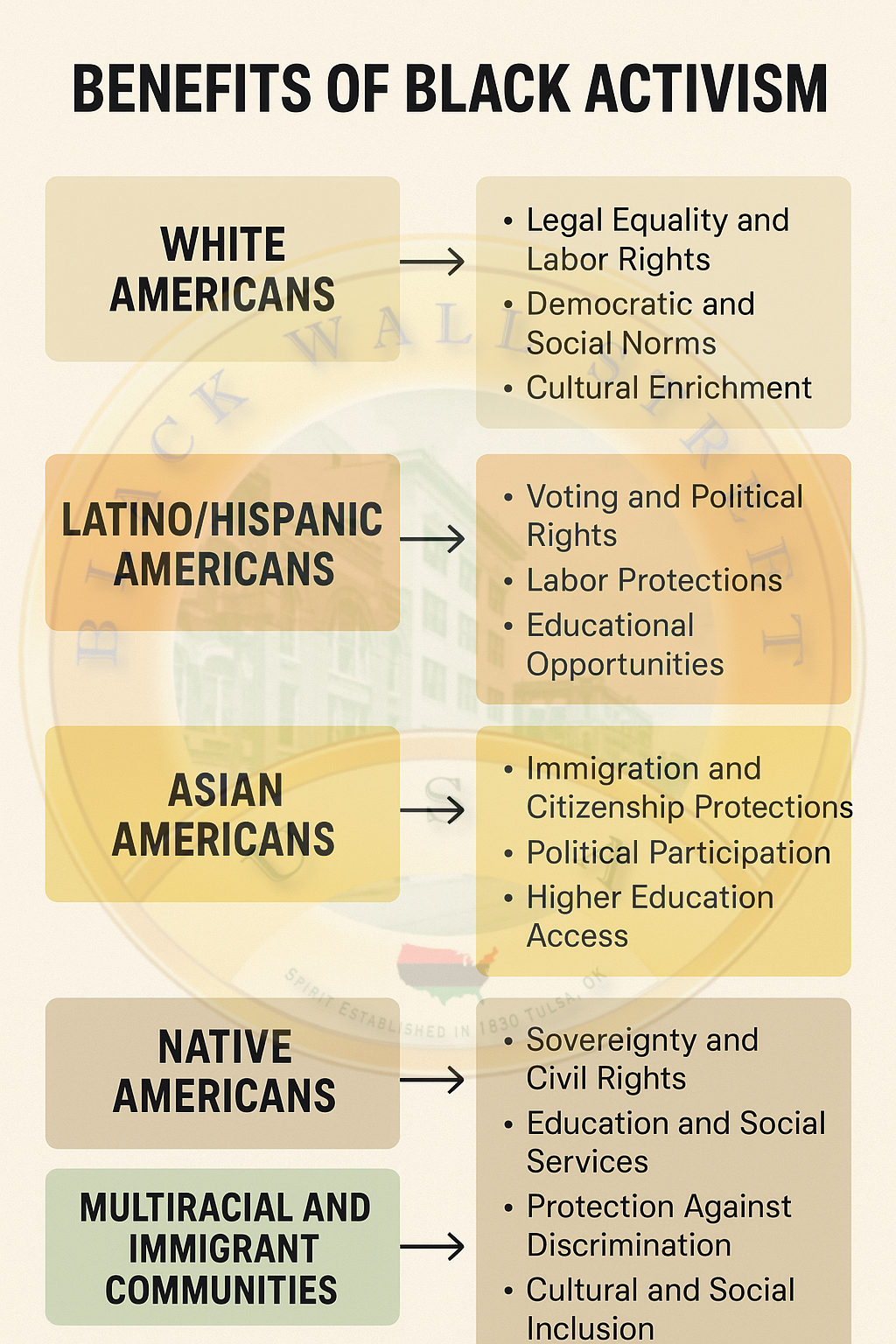
Higher education, one of New Jersey’s most visible engines of upward mobility, is deeply implicated in the history of slavery. Rutgers University’s Scarlet and Black project has documented how its early benefactors were slaveholders, how its students came from families enriched by slavery, and how Black people were used in the construction and maintenance of the university’s early physical footprint. At Princeton University, enslaved people cooked meals, cleaned dormitories, and tended to faculty members. Presidents of the university owned slaves and publicly defended the institution of slavery. These elite institutions, while today branding themselves as champions of diversity, sit atop foundations cemented by anti-Black violence and dispossession.
The acknowledgment of this history has prompted symbolic acts—public statements, exhibitions, and revised curricula—but critics argue that these actions fall short of true reparative justice. For descendants of New Jersey’s enslaved, there is little comfort in acknowledgment without material redress. Activists have called for free tuition for Black students, land return or reparative housing programs, and economic investments in historically Black neighborhoods as meaningful forms of justice. These proposals are often met with resistance, framed as divisive or unrealistic, yet they mirror the scale of the harm done over centuries. Without them, the continuity of inequality remains unbroken.
The personal stories of New Jersey’s enslaved people, preserved in part through runaway slave advertisements, court petitions, and rare oral histories, provide haunting glimpses into the human cost of this system. One such account is that of Betsey Stockton, born into slavery in Princeton in 1798 and later freed by the prominent Stockton family. Betsey went on to become a pioneering educator and missionary, teaching freed Black children in Princeton and later establishing a school in Hawaii. Her story demonstrates both the violent restrictions of slavery and the extraordinary resilience of those who survived it. Stockton’s life was a rare exception; for most enslaved people, freedom came without land, compensation, or structural support, plunging them into cycles of poverty and racial exclusion.
Another such case is the 1824 manumission of a woman known only as Dinah in Hunterdon County. Her manumission papers included stipulations that she not become a financial burden to the county—revealing how even freedom was conditional, grudgingly granted, and shaped by fear of Black dependency rather than justice or repentance. Dinah’s experience was common; many freed Black people were expected to fend for themselves in a society that had used their labor but refused to grant them dignity or equity.
In the postbellum period, New Jersey’s reluctance to support Black enfranchisement and reconstruction became starkly evident. Although the state eventually ratified the Thirteenth Amendment, it rejected the 14th and 15th Amendments initially, reflecting deep resistance to Black citizenship. While federal laws superseded state refusals, New Jersey’s institutional resistance left lasting damage. Black schools were underfunded, Black neighborhoods over-policed, and Black businesses denied loans and licenses. As Jim Crow laws spread through the South, New Jersey developed its own more insidious forms of racial segregation. Through redlining maps in Newark and zoning laws in Englewood, Black communities were hemmed in, dispossessed, and underdeveloped.
Black labor during the Great Migration was welcomed only insofar as it served capital needs. As thousands of Black southerners moved to New Jersey cities seeking work in shipyards, factories, and railways, they faced housing discrimination, school inequality, and workplace racism. Their presence was often met with white hostility and periodic eruptions of violence. The 1967 Newark Rebellion—commonly mislabeled as a riot—was one such boiling point, sparked by the police beating of a Black cab driver but rooted in centuries of injustice. The rebellion was both a cry of despair and a demand for justice, one that echoed the same desire for dignity that motivated enslaved people to escape or resist centuries earlier.
Today, New Jersey’s public schools often fail to adequately teach this history. In many districts, slavery is mentioned only in passing, if at all, and students graduate without any awareness that their state held humans in bondage until the eve of the Civil War. The story of slavery in New Jersey is not peripheral to American history; it is central. It is the story of a state that helped build a nation through exploitation, resistance, hypocrisy, and resilience. It is the story of wealth accumulated on the backs of others, of institutions that wore the mask of liberty while practicing bondage, and of people who were denied humanity yet carved it out for themselves through struggle.
To speak honestly about slavery in New Jersey is to challenge the myth that the North was somehow innocent in the crime of American slavery. It is to confront the reality that racism was not born in the South, nor did it end with abolition. It evolved, adapted, and took root in boardrooms, classrooms, and courtrooms across New Jersey. It is to see the unmarked graves in old churchyards and the forgotten Black settlements that were pushed to the margins. It is to ask not only what happened, but what must be done now.
The responsibility lies not just with historians but with every citizen, every institution, and every lawmaker. The work of remembrance is political, cultural, and moral. It is an act of love and accountability. It is the only path to a future that honors the past not with silence or shame, but with clarity and courage. Only then can New Jersey begin to reconcile its promise of liberty with the reality of its legacy.
This journey toward reconciliation and justice must begin with an unflinching commitment to truth. Truth-telling is the foundation of justice, and the truths about slavery in New Jersey are not merely historical—they are structural, living, and tangible. They reside in the prison population, where Black people in New Jersey are incarcerated at one of the highest rates in the nation. They exist in the widening racial wealth gap, where Black families in New Jersey own a fraction of the wealth of white families, a disparity that traces back to generations of exclusion from land, credit, and inheritance. They appear in public health disparities, in school funding inequities, and in the over-policing of Black communities. These are not accidents of history but the cumulative result of decisions made across centuries—decisions rooted in the original denial of Black humanity through slavery.
Slavery shaped not only the economic infrastructure of New Jersey but its cultural and social systems. Racial hierarchies were maintained and normalized through religious institutions, media, and education. Sermons preached from pulpits defended slavery as divinely sanctioned. Newspaper editorials equated Black freedom with social chaos. Schoolbooks erased the contributions of Black people or portrayed them in demeaning stereotypes. These mechanisms worked together to ensure that even after formal emancipation, the idea of Black inferiority continued to justify exclusion, surveillance, and exploitation.
For every enslaved person who labored in a field, tended a hearth, or served a household in New Jersey, there were also moments of resistance. Resistance was not only found in escape or rebellion but in the quiet acts of survival—teaching children forbidden knowledge, preserving spiritual traditions, maintaining kinship ties under the threat of sale and separation. These acts were revolutionary. They sustained communities and created the foundation for future movements for freedom. In every Black church service, every family reunion, and every political rally in New Jersey’s Black communities, there are echoes of this legacy.
Slavery’s long arm even extends into the environmental history of New Jersey. Much of the state’s farmland and infrastructure was developed by enslaved labor. In some places, environmental degradation caused by industrial activity occurred in historically Black communities that were originally formed by free Black people and manumitted slaves who had been relegated to the least desirable lands. Today, environmental racism persists in places like Camden and Newark, where residents face higher rates of pollution, asthma, and contaminated water. These patterns reflect a history of geographic and economic marginalization tied directly to the legacies of slavery and segregation.
At the same time, Black New Jerseyans have built resilient and thriving communities. From the African American Heritage Museum of Southern New Jersey to the historically Black neighborhoods in Trenton and Plainfield, there are vibrant traditions of resistance, celebration, and self-determination. Black fraternal organizations, women’s clubs, educational institutions, and advocacy groups have played crucial roles in preserving cultural heritage and advancing social justice. These institutions carry the memory of slavery not as a source of shame, but as a testament to survival and ingenuity.
In recent decades, New Jersey has seen the emergence of cultural, educational, and political efforts to reckon with its slaveholding past. Local historical societies, independent scholars, and community organizers have uncovered archives, organized walking tours, and hosted public forums to raise awareness. Cities like Montclair, Princeton, and Atlantic City have explored ways to incorporate this history into their public monuments and educational programs. But these efforts, though valuable, are often underfunded and met with resistance from those who prefer a sanitized version of history.
This resistance is not accidental. It stems from a fear that truth might demand change—that acknowledging slavery might require the redistribution of resources, the re-evaluation of power structures, or the reparation of harm. But reckoning does not weaken democracy; it strengthens it. In New Jersey, the pursuit of racial justice is not a diversion from the state’s values—it is the realization of them. A state that once called itself “the Garden State” must also recognize the hands that planted and harvested its fields under bondage.
There are signs of progress. In 2019, Governor Phil Murphy signed a law creating the Amistad Commission to ensure that Black history—including slavery—is accurately taught in New Jersey schools. However, implementation has been inconsistent, and many teachers report a lack of training, support, or curriculum materials to adequately address slavery’s full scope and impact. The need for investment in comprehensive, community-informed education remains urgent.
Beyond the classroom, legal reform is also essential. While slavery has been abolished, the state’s carceral system bears its imprint. The overrepresentation of Black people in New Jersey’s jails and prisons, the criminalization of poverty, and the use of unpaid prison labor call to mind the continuation of coerced labor under a different name. Advocates have called for a constitutional amendment to remove all language that permits involuntary servitude, even as punishment for a crime. This effort echoes the Thirteenth Amendment’s loophole and demands its closure at the state level.
Economic justice remains another crucial front. Reparations are not only a matter of money but of structural repair. Access to capital, land, education, and political power must be expanded for Black communities. This means investing in historically Black neighborhoods, supporting Black-owned businesses, expanding homeownership opportunities, and restoring lands and resources taken through eminent domain or discriminatory zoning. It also means holding accountable those institutions that profited from slavery—whether they are universities, banks, or municipalities—and demanding they contribute to a more equitable future.
The story of slavery in New Jersey is not just about Black suffering but also about Black resilience. It is about the families who stayed together despite forced separations, the churches that provided refuge and purpose, the educators who taught in secret, and the freedom fighters who refused to accept bondage as destiny. It is about people like Lucy King, an enslaved woman in Bergen County who petitioned for her freedom and became a matriarch of one of the state’s first free Black communities. It is about generations of Black children who learned to dream even when the world around them told them they were nothing.
Their dreams built New Jersey. Their labor, unpaid and unrecognized, shaped its farms, towns, universities, and industries. Their resistance challenged its hypocrisy. Their survival is a rebuke to those who would erase them. To honor their memory, we must do more than remember—we must repair. We must write new laws, erect new monuments, and fund new institutions that reflect the truth of our shared history.
New Jersey’s role in American slavery is undeniable. Its wealth, institutions, and culture were shaped by the lives and deaths of enslaved people. To ignore this fact is to betray the values we claim to uphold. To confront it is to finally begin a journey toward justice. And so the story continues—not in silence or shame, but in the voices that rise today from classrooms, pulpits, and city halls across the state, demanding not just acknowledgment, but action. For the soul of New Jersey, for the memory of those who were bound and beaten, for the future of freedom—we must continue.
To continue this story is to peel back yet more layers of a truth that has too long remained obscured. The institutions of slavery, their enablers, and beneficiaries are not confined to dusty archives or long-forgotten plantations—they manifest in our present-day politics, our neighborhood borders, our tax codes, and the persistent inequality between communities. New Jersey’s foundational involvement in slavery laid the tracks upon which entire systems of racial disparity were constructed.
The enslaved made up a significant portion of the labor force in early New Jersey, but their contributions were stolen and unacknowledged. That theft continues to echo in generational poverty, in the underfunded schools of Black and brown children, in the lack of Black homeownership and intergenerational wealth, and in the barriers to capital that Black entrepreneurs still face across the state.
The legal foundations of slavery in New Jersey must be revisited not merely as archaic statutes but as the blueprint for centuries of racial hierarchy. Early colonial legislation cemented the legal and social notion that African-descended people could be permanently deprived of freedom. Even as some legal progress came in the form of manumission laws, they were often narrow in scope, heavily conditional, and usually did not apply retroactively.
The so-called “gradual abolition” laws passed in 1804 and revised thereafter were, in effect, extended bondage under the guise of reform. Children born to enslaved mothers after that date were required to serve until the age of 21 for women and 25 for men—a burden not applied to white apprentices or servants. This loophole guaranteed that slavery's economic benefits to white landowners and business owners would continue through the lifetime of an entire generation.
The reluctance of New Jersey to fully abolish slavery until it was forced to do so by the Thirteenth Amendment speaks volumes about the state’s economic dependence on the institution. The 1860 census revealed that dozens of people were still listed as "apprentices for life" even as the Civil War raged. At the very moment that national policy was shifting toward abolition, New Jersey was still clinging to the idea of forced Black labor. Unlike many of its northern neighbors, New Jersey refused to ratify the Thirteenth Amendment initially and only did so under federal pressure—testament to the deep institutional entrenchment of slavery in its political culture.
Yet alongside this oppressive machinery grew a counter-tradition of Black defiance, organization, and leadership. Long before the Civil Rights Movement of the 20th century, New Jersey’s Black population built formidable networks of resistance and mutual aid. African Methodist Episcopal (AME) churches across the state became centers of social life, political education, and underground resistance. In cities like Camden, Trenton, and Elizabeth, Black citizens formed literary societies, debating clubs, and anti-slavery organizations. These spaces nurtured a generation of Black intellectuals and activists who challenged white supremacy in every arena—from the classroom to the courts.
One figure who must be remembered is Reverend Peter Williams Jr., one of the first African American Episcopal priests, whose family had New Jersey roots and whose ministry extended into the state. His advocacy on behalf of abolition and Black education inspired similar activism within Black churches throughout New Jersey. Similarly, abolitionist Sarah Maples, though lesser-known, organized Black women in New Jersey around issues of literacy and self-sufficiency, challenging both white male dominance and the patriarchy within her own community. Their stories, like those of many others, remain under-taught and under-recognized but are essential to understanding how the state’s Black population responded to enslavement with agency, dignity, and determination.
The Underground Railroad was deeply embedded in New Jersey’s geography, with safe houses stretching from Cape May to Jersey City. These were not passive hiding places but active centers of logistical planning, courage, and mutual defense. Some of the most vital routes passed through towns like Haddonfield, Burlington, and Bordentown, where both Black and white abolitionists risked arrest and violence to shelter freedom seekers. The work of William Still, who chronicled many of these journeys and maintained active ties to New Jersey safe houses, continues to be one of the most important records of this history. Still’s archives include letters, testimonials, and descriptions of formerly enslaved people who passed through New Jersey seeking freedom—each story more harrowing and heroic than the last.
After emancipation, the federal Freedmen’s Bureau attempted to provide a semblance of support and protection for formerly enslaved people, but its reach into New Jersey was limited by design. As a Northern state, New Jersey was not considered a primary focus of Bureau operations, yet many freedmen migrated north to escape the perils of the postbellum South. The institutions that formed in New Jersey to assist these migrants—churches, fraternal organizations, Black newspapers—were the direct descendants of abolitionist networks. They took on the tasks that the federal government would not: job placement, legal assistance, schooling, and community organizing. They fought to make freedom meaningful, not just symbolic.
The failure of Reconstruction, coupled with the rise of Jim Crow and the establishment of Northern-style segregation, meant that Black New Jerseyans were still not full citizens. The state's school systems often assigned Black children to inferior, segregated schools well into the 20th century. Housing discrimination was rampant, and Black residents were steered into declining neighborhoods through redlining and discriminatory zoning policies. The Home Owners’ Loan Corporation, established during the New Deal, explicitly rated Black and mixed-race neighborhoods as financial risks, denying residents access to the capital that built white suburban wealth. These practices were not confined to the South; they were carried out with equal vigor in Essex County, Bergen County, and across the Garden State.
The fight against these injustices was not passive. Black leaders and community organizations staged sit-ins, legal challenges, and economic boycotts. The 1930s and 1940s saw the rise of labor activism that included Black workers in port cities like Newark and Elizabeth, where unions finally began addressing racial exclusion. In the decades that followed, the NAACP, the Urban League, and a host of grassroots organizations organized campaigns to desegregate schools, expand voting rights, and secure fair employment practices. In many of these efforts, New Jersey’s Black women were at the forefront—organizing, fundraising, and strategizing behind the scenes and on the frontlines.
The 1967 Newark Rebellion, often characterized in official narratives as a breakdown of civil order, was in fact a culmination of long-standing grievances rooted in slavery’s legacy. Police brutality, substandard housing, unemployment, and political disenfranchisement ignited a week of uprisings that changed the city’s trajectory. What followed was an intensification of both surveillance and organizing. Community control movements, Black Panther chapters, and tenant rights groups flourished in response to systemic neglect. These organizations continued the legacy of resistance born in slavery—adapting their strategies to face new forms of oppression.
Today, as movements for racial justice gain momentum again in the wake of high-profile police killings and systemic racism, New Jersey remains a critical battlefield. From the George Floyd protests to the debates over critical race theory, slavery’s legacy is once again at the center of public discourse. In towns like Maplewood, Highland Park, and Jersey City, students, teachers, and parents have pushed for a more honest telling of New Jersey’s past, one that includes slavery, resistance, and the ongoing consequences of both.
Slavery is not just a historical fact—it is an ongoing condition that continues to shape material reality. Its abolition was not its end. In many ways, slavery morphed into new forms: convict leasing, sharecropping, redlining, mass incarceration, and racial capitalism. New Jersey’s institutions—its colleges, banks, and political structures—are indebted to the labor of the enslaved. That debt is unpaid. It is measurable in the opportunities denied to generations of Black families, in the neighborhoods that were never allowed to flourish, and in the wealth that was never passed on.
The question before New Jersey now is whether it will choose silence or justice. Whether it will continue to bury this history under the weight of denial or excavate it and let it breathe. Whether it will simply acknowledge, or begin to repair. The task is not merely academic—it is moral. It is spiritual. And it is political. For justice is not a passive force; it is something built, demanded, and protected by those who refuse to forget.
To walk the streets of Princeton or Camden or Trenton today is to walk on land that remembers. Land that has absorbed the footfalls of enslaved children, the prayers of mothers separated from their sons, the quiet tears of men who were made into property. That land does not forget. And neither should we. The story of slavery in New Jersey is not over—it lives on in the struggle for reparations, for truth-telling, for liberation. And in that struggle, there is hope.
Hope lies in the refusal of New Jersey’s Black communities to disappear, to be silent, or to settle for mere survival. It lies in the students at Rutgers who demanded that their university reckon with the fact that its founders were slaveholders and that its earliest donors profited from the bondage of African people. It lies in the educators who push back against sanitized history textbooks and insist on teaching their students the full, complicated truth. It lies in the descendants of the enslaved who preserve the oral histories of their ancestors, reclaiming names and stories that history tried to erase.
Hope also lies in the cultural reclamation that has taken place across New Jersey. Museums such as the Stoutsburg Sourland African American Museum in Hopewell Valley and the African American Heritage Museum of Southern New Jersey offer crucial spaces for learning and healing. These institutions work to preserve the memory of New Jersey’s Black communities, many of which trace their roots to enslaved people who bought their freedom, fled bondage, or were born free in a hostile world. They catalog the artifacts, documents, and oral traditions that tell a fuller story of the state—one that acknowledges both the cruelty of slavery and the unbreakable will of those who endured it.
In the legal realm, too, there is cause for cautious optimism. Some lawmakers have introduced legislation to create a Reparations Task Force for the state, a first step toward concrete redress. The idea is not merely symbolic. A serious investigation into how slavery and its aftereffects created the racial disparities we see today could lead to actionable policies—housing grants, educational funding, debt forgiveness, and land return—that would begin to repay the centuries-long theft of wealth and opportunity. These efforts face opposition, but they are grounded in justice and backed by growing public support. That support has grown not just from national conversations about systemic racism, but from local awakenings, as more New Jerseyans learn that the state they thought was “free” had in fact been deeply complicit in slavery.
There is also hope in the work of local genealogists and historical researchers who, piece by piece, are reconstructing the biographies of enslaved individuals. In Bergen County, a collaborative project has identified and documented hundreds of names of enslaved people recorded in wills, property inventories, and manumission papers. These are not just names on paper—they are people whose lives and stories are finally being honored. Their descendants are reconnecting with a history that was once hidden or distorted, and they are reclaiming the dignity and identity denied to their ancestors. This process is slow, painstaking, and often emotionally taxing, but it is necessary. It reminds us that behind every statistic about slavery lies a person who loved, feared, dreamed, and resisted.
The conversation around slavery in New Jersey is no longer confined to the academic or activist margins. It has entered the political mainstream, the public square, and the educational system. Public art installations, such as the Harriet Tubman Monument in Newark and plans for a slavery memorial in Princeton, represent not just symbolic gestures, but public acknowledgments of a shared history that has been buried too long. These monuments are not answers in themselves—they are markers of a broader commitment to truth. They must be paired with policy, investment, and transformation to have real impact. Yet they matter, because they provide a place for reflection, mourning, and recognition.
New Jersey’s experience with slavery complicates the national narrative that draws a clean line between North and South, slave state and free state. The state’s gradual emancipation law of 1804, often praised for its early timeline, was in truth a mechanism for prolonging slavery under another name. The existence of “slavery for life” through apprenticeships meant that some New Jerseyans lived their entire lives in bondage well into the 19th century. Even after legal slavery ended, racial subjugation continued through social norms, legal barriers, and economic exclusion. The abolition of slavery did not usher in a period of equality—it simply changed the mechanisms of domination.
Understanding this truth allows us to see the persistence of white supremacy not as a Southern relic but as a national project, one that thrived in states like New Jersey through policy and practice. Whether through the forced displacement of Black communities to make way for highways or urban renewal projects, or through the denial of home loans and business capital, the legacy of slavery continues to manifest in ways that are entirely contemporary. Acknowledging this reality is not about assigning guilt to individuals, but responsibility to systems—and to those with the power to change them.
New Jersey’s educational institutions must lead in this reckoning. Schools, colleges, and universities that benefited from slavery and racial exclusion have a particular obligation to investigate their histories and take meaningful steps toward reparative justice. This includes not only publishing the results of these investigations, but implementing structural changes: endowed scholarships for descendants of enslaved people, community partnerships with Black neighborhoods, and curriculum changes that center Black history as foundational, not supplementary. When universities adopt these practices, they don’t just correct the record—they transform the institutions themselves into engines of justice.
Religious institutions, too, must reckon with their pasts. Churches that once owned enslaved people, rented their labor, or endorsed slavery from the pulpit must engage in truth-telling and reparative ministry. Some have begun this process, holding public ceremonies of apology, creating educational programs, and financially supporting local Black-led organizations. Others remain silent. But silence, in this case, is complicity.
The work of justice is not linear, nor is it comfortable. It requires confronting painful truths, disrupting entrenched narratives, and redistributing power. But in doing so, it offers something far more valuable: a chance at collective healing, a more honest democracy, and a future where the dignity of every person is recognized not as a privilege, but a right. The struggle for this future is not new. It is the same struggle that animated the enslaved who prayed in secret, fled in the night, or stood tall before judges and refused to be broken. It is the same spirit that filled New Jersey’s abolitionists, civil rights laborers, and freedom fighters.
They have handed that struggle to us.
So we must ask: what will we do with it?
Will we choose to build monuments while leaving systems intact, or will we dismantle the foundations of inequality and construct something better? Will we continue to teach half-truths to our children, or will we trust them with the full story, believing in their ability to carry it forward? Will we make reparations a slogan or a reality? The answers to these questions will shape not only how we remember the past, but how we inhabit the present and build the future.
Slavery in New Jersey did not begin with chains and it did not end with emancipation. It evolved, adapted, and persists in new forms. But so too does the resistance. And in that resistance, there is a call—to truth, to memory, to justice, and to hope. That call is not abstract. It is immediate. It is urgent. And it is ours to answer.
This call is now echoing in town halls, classrooms, church sanctuaries, and on city blocks where the descendants of enslaved New Jerseyans still fight to be seen and heard. It reverberates through grassroots movements like the New Jersey Institute for Social Justice, which has long pushed for economic equity, voting rights protections, and reparative action. These organizations embody a commitment not only to confront the legacy of slavery but to dismantle the racial caste system that slavery created and left behind. Their work is not theoretical—it is focused on housing access, school desegregation, youth incarceration reform, and ending voter suppression in communities still living in the long shadow of bondage.
The modern racial wealth gap in New Jersey is not coincidental—it is structural. A state where the median net worth for white families is over $300,000, while that of Black families hovers near zero, is a state still shaped by the legacy of unpaid Black labor, generational exclusion, and redlining. Reparations, in this light, are not merely about the past—they are about rectifying material harm in the present and making whole what was systemically broken. A reparative justice model rooted in New Jersey’s specific history would begin by restoring land taken from Black families, by funding community schools and Black-led institutions, by providing direct compensation to descendants of enslaved people, and by erasing the debt that was incurred in the pursuit of equality that should have been guaranteed.
This cannot be merely symbolic. Too often, society offers apologies and plaques but denies policy change. Yet without policy, the acknowledgment of slavery becomes a hollow gesture. True redress requires legislation. It requires political courage. It requires shifting public funds, rewriting laws, and disrupting business as usual. And above all, it requires centering Black voices—especially those who have long been denied space at decision-making tables.
In recent years, New Jersey’s younger generation has stepped into this role with fierce clarity. Students have demanded renaming of buildings and streets named after enslavers. Artists have created murals and spoken word performances that speak directly to the generational pain of slavery and the urgent need for liberation. Local historians have fought to preserve Black cemeteries threatened by development. Every one of these acts is a form of memory reclamation, a refusal to let history be dictated solely by those who wrote it from the top of the racial hierarchy.
That hierarchy—first crafted on ships, codified in colonial law, and reinforced through violence—must be undone not just in policy but in the hearts and minds of the people. Part of that unlearning begins with public education. It is no longer acceptable for New Jersey’s children to be taught that slavery was a Southern issue or that the North was a moral beacon. They must learn that in their own towns, Black people were bought, sold, raped, and buried in unmarked graves. They must also learn that those same people built towns, resisted oppression, and left a cultural and spiritual legacy that shaped the state’s identity. Only then can they grow into citizens capable of honoring the truth and acting in justice.
The churches of New Jersey, many of which were once safe havens for both enslavers and the enslaved, are likewise reclaiming their role in the struggle. Faith leaders now preach sermons about reparations, host forums on racial justice, and open their archives to examine how their denominations benefited from slavery. Interfaith coalitions are working to create moral frameworks for reparations, rooted in scripture and the enduring truth that God requires justice, not just worship.
Alongside these moral reckonings is an economic one. Major corporations and banks with deep roots in New Jersey have begun to face scrutiny for their involvement in slavery and post-emancipation racial exclusion. Insurance companies that once sold policies on enslaved people’s lives. Shipping companies that profited from the Middle Passage. Banks that used enslaved labor as collateral or processed loans that kept slavery profitable. These firms, some still operating today, owe more than words—they owe restitution. Whether through community investment funds, job creation in historically Black neighborhoods, or direct reparative payments, they must be held accountable for their role in one of the greatest crimes in human history.
This moment—painful, overdue, yet ripe with possibility—requires collective resolve. It calls on local governments to commission truth and reconciliation processes. It calls on universities to prioritize equity over tradition. It calls on every citizen to examine the land they stand on, the wealth they hold, the silence they’ve kept, and to ask: who paid for my place here? The answer is often found in the unpaid labor of people stolen from Africa, forced to labor in the fields and homes of New Jersey under the whip of a system that denied their humanity.
There is no neutrality in the face of this history. To claim ignorance is no longer an option. To avoid responsibility is to choose the side of the oppressor. But to act—to teach, to legislate, to repair—is to participate in the sacred work of justice. It is to join the ranks of those who never gave up: the enslaved who fled, the abolitionists who fought, the families who stayed and built in spite of everything, the freedom seekers whose names we may never know but whose spirits guide our every step forward.
Let this generation be the one that does not stop at confession, but moves toward restitution. Let it be the generation that redefines what it means to be a New Jerseyan—not as someone who simply lives in a free state, but as someone who helps make freedom real. Let it be the generation that finally, fully, answers the call of history with courage, clarity, and commitment. For in doing so, we do not only honor the memory of the enslaved—we fulfill their dream. And in that fulfillment, we redeem not only their past, but our shared future.

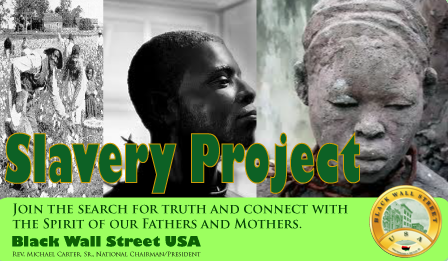
Alabama
Alaska
Arizona
Arkansas
California
Colorado
Connecticut
Delaware
Florida
Georgia
Hawaii
Idaho
Illinois
Indiana
Iowa
Kansas
Kentucky
Louisiana
Maine
Maryland
Massachusetts
Michigan
Minnesota
Mississippi
Missouri
Montana
Nebraska
Nevada
New Hampshire
New Jersey
New Mexico
New York
North Carolina
North Dakota
Ohio
Oklahoma
Oregon
Pennsylvania
Rhode Island
South Carolina
South Dakota
Tennessee
Texas
Utah
Vermont
Virginia
Washington
West Virginia
Wisconsin
Wyoming
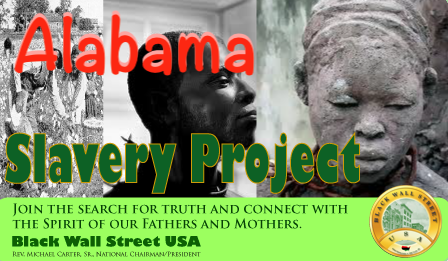
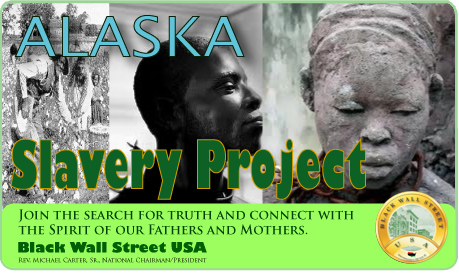



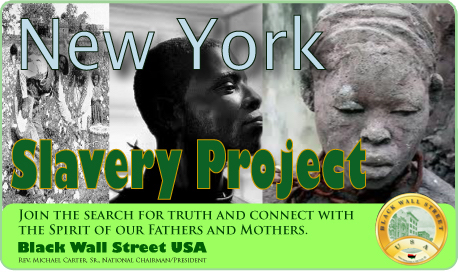

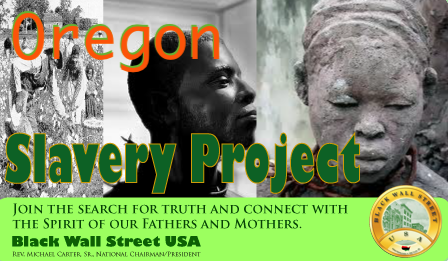
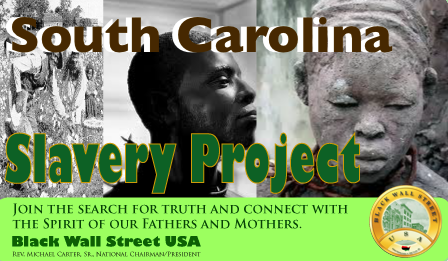
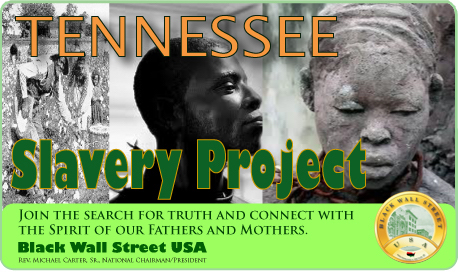
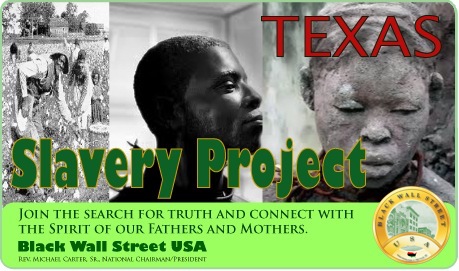



BlackWallStreet.org

Slave Records By State
See: Slave Records By State
Freedmen's Bureau Records
See: Freedmen's Bureau Online
American Slavery Records
See: American Slavery Records
American Slavery: Slave Narratives
See: Slave Narratives
American Slavery: Slave Owners
See: Slave Owners
American Slavery: Slave Records By County
See: Slave Records By County
American Slavery: Underground Railroad
See: American Slavery: Underground Railroad

